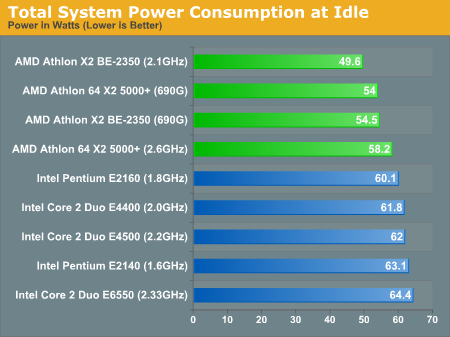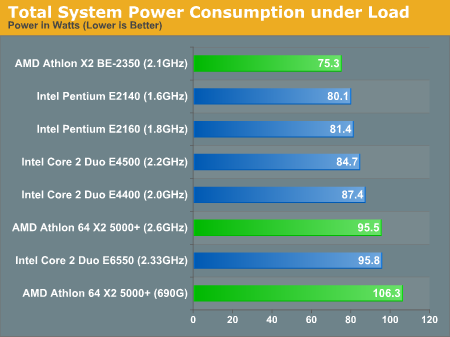Midrange CPU Roundup: It's Time to Buy
by Anand Lal Shimpi on September 28, 2007 2:00 AM EST- Posted in
- CPUs
Power Consumption
We standardized on two platforms for power consumption: Intel's G33 and NVIDIA's GeForce 7050PV, although we included 690G numbers for comparison. We only used CPUs that we actually had instead of simply adjusting clock multipliers to simulate CPUs.

The AMD chips/platforms are lower power than their Intel counterparts at idle, but the situation changes dramatically under load:

Under load the Athlon 64 X2 5000+ eats up about as much power as the Core 2 Duo E6550, and the 690G chipset actually drives power consumption up even more under load (even though it's better than the NVIDIA solution at idle).
The only salvation for AMD is that the Athlon 64 X2 BE-2350 pulls less power than all of Intel's offerings, but compared to the Pentium E2160 the advantage is only about 6W under full load. AMD does technically win the power game with the BE-2350, but the margin of victory isn't great enough to get too excited about.
We standardized on two platforms for power consumption: Intel's G33 and NVIDIA's GeForce 7050PV, although we included 690G numbers for comparison. We only used CPUs that we actually had instead of simply adjusting clock multipliers to simulate CPUs.

The AMD chips/platforms are lower power than their Intel counterparts at idle, but the situation changes dramatically under load:

Under load the Athlon 64 X2 5000+ eats up about as much power as the Core 2 Duo E6550, and the 690G chipset actually drives power consumption up even more under load (even though it's better than the NVIDIA solution at idle).
The only salvation for AMD is that the Athlon 64 X2 BE-2350 pulls less power than all of Intel's offerings, but compared to the Pentium E2160 the advantage is only about 6W under full load. AMD does technically win the power game with the BE-2350, but the margin of victory isn't great enough to get too excited about.










44 Comments
View All Comments
Darth Farter - Friday, September 28, 2007 - link
why not the cool & quiet idle power numbers?seeing they're running at full speeds at idle is besides the point of an "idle" measurement in this age with powersavings...
tnx though on the bios update request from asus... I want to tweak my timings too.
Anand Lal Shimpi - Friday, September 28, 2007 - link
C&Q and EIST were both enabled for the idle and load power numbers. Actually all the benchmarks were run with those settings enabled.Take care,
Anand
archcommus - Friday, September 28, 2007 - link
I realize the benchmarks are run at 1024x768 to make the tests CPU-limited, does that mean all, or at least most, of the extra horsepower needed for resolutions above that comes from the GPU? If so, does that mean I could run games at 1280x1024 well with a high-end card and one of the AMD CPUs from this round-up? Or would that be a bad match-up? If that would work it's an appealing upgrade path alternative to jumping platforms.nosfe - Friday, September 28, 2007 - link
why not color code those performance graphs so that we can easily see which processors are competing at the same price